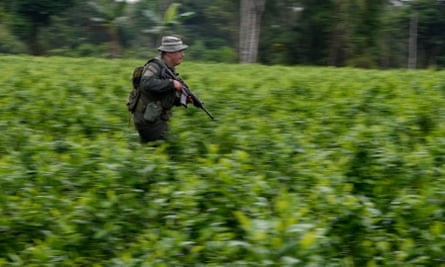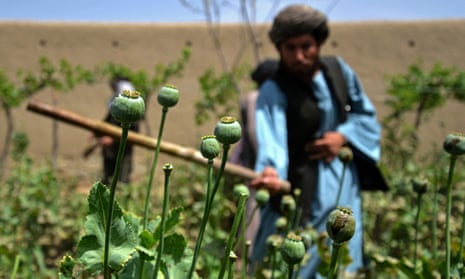Almost $1bn (£800m) of aid has been spent on a global “war on drugs” over the past decade that has fuelled human rights abuses, according to a new report.
Analysing data from the Organisation for Economic Co-operation and Development (OECD), the NGO Harm Reduction International (HRI) found that, between 2012 and 2021, the US and the EU spent $550m and $282m of their aid budgets respectively on programmes that supported drug control policies. The UK has spent $22m since 2012 – more than $10m of that in 2012 – which has been used to support surveillance capabilities in Colombia, Mozambique and the Dominican Republic, and undercover policing in Peru.
Under Joe Biden, the US has hugely increased the amount of aid spent on narcotics control from $31m in 2020 to $309m in 2021. Some of the money has been used by the Drug Enforcement Agency to train police and special units in Vietnam and Honduras, which have been accused of arbitrary arrests and killings.
The report found more aid globally was spent on supporting drugs policies ($323m) in 2021 than on school feeding projects ($286m) or labour rights ($198m). Ninety-two lower-income countries were listed as having received aid for narcotics control, including Afghanistan, which received money to train police after the Taliban takeover in 2021.
“When you think about development, you don’t really think about it being used for those kinds of activities – you think of poverty reduction, working towards development goals on health or education,” said Catherine Cook, sustainable financing lead at HRI, which monitors the impact of drug policies. “This money is actually being used to support punitive measures – so policing, prisons, essentially funding the ‘war on drugs’, even though we know the ‘war on drugs’ and punitive policies have repeatedly failed.”

This year, the UN’s human rights chief, Volker Türk, called for an end to the “war on drugs”, saying it had failed to stop drug production while leading to mass arrests and killings by authorities.
HRI said donor governments should stop funding programmes that support punitive drug policies and stop counting it as aid.
Steve Rolles, senior policy analyst at the charity Transform Drug Policy Foundation, said aggressive drug policies aimed at cutting off supplies often harmed vulnerable communities more than those making the most profits from the business. He said donors were “effectively sponsoring state violence”. “In Latin America, it’s often people who lack other economic opportunities or displaced people and illegal migrants – people who don’t have many other opportunities – [who] often end up working in the illicit drug economy, out of a lack of other economic opportunities.”
He said these people tend to “get caught in the crossfire during military policing drug enforcement interventions, they tend to be the people who get arrested”.
Rolles said it was clear that the “war on drugs” had failed. “Millions of tonnes of drugs are intercepted, endless prisons are filled with drug producers, traffickers, smugglers and sellers. And yet, for all of the increasing resources poured into this, drugs are cheaper, more available, more potent than they’ve ever been,” he said.
